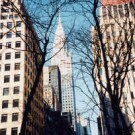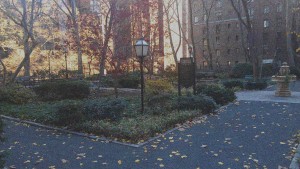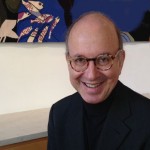My New York by Charles Mathes

I’m the author of a series of stand-alone mysteries, each featuring a different young woman with a problem in her past. A hotel-inspector orphan searching for her family. The professional magician desperate to understand why her grandfather was murdered. A pair of antique-dealer sisters whose grandmother sank into poverty after a Broadway career. A professional stage fight director whose father lies in a coma.
The books appear to be connected only by the word “Girl” in the title, but in fact each novel includes the same pivotal character with whom all of my heroines interact. The character’s name is New York City. Like any pivotal character my New York is a catalyst that forces my heroines to change, to grow, to develop.
Perhaps this is because New York forced me to change. Everyone who comes to the City to forge a career has to put aside old concepts of how things are supposed to work and reinvent him or herself to survive in a town that is both without limits and without mercy.
The stereotype is that you have to move fast here or you’ll get trampled, talk fast or you won’t get in a word edgewise and think fast or you’ll be left without the shirt on your back or a penny to your name.
The reality is that the city lets you be anything you want to be (which is probably why so many misfits end up here), but always makes you keep things in perspective. It’s hard to think you’re such a big deal when buildings soar sixty stories on every corner, but it’s hard not to feel like a king or queen when you’re walking down Fifth Avenue and the sun is shining and the city is pulsating with the energy of a million people certain that they are in the nexus of the world.
Like most “real” New Yorkers I was born out of town – Cleveland, Ohio, to be exact. My first taste of the Big Apple came on a family vacation when I was just a kid. I was used to the suburbs and had never seen anything like Manhattan before. Our hotel was something out of a movie, as bustling and gigantic as an airport, full of little shops and high ceilings and bellboys running around in red uniforms. A cab took us to a nondescript building on a seemingly deserted street. We opened the door and found ourselves in a cavernous restaurant full of beautifully dressed sophisticates. I ordered Lobster Thermador and nobody batted an eye.
When we came out of a movie theatre on Broadway at eleven o’clock at night the streets were more crowded with people than downtown Cleveland was at rush hour. And such people! Ladies with faces thick with make-up and cynicism smiling out from dark corners at passersby; guys with sharkskin suits and pug noses lighting up Parliaments with gold cigarette lighters; a leathery old broad dressed like a fireworks display and bellowing to herself about how the Commies had taken over the government.
My father, the traveling salesman, told me that if you waited around long enough in Times Square, you would eventually run into everyone you had ever met. I gave a skeptical glance around and to my astonishment was hailed by a kid I recognized from summer camp in Indiana the summer before. I was hooked. New York was pure magic, a place of miracles!
In high school I found myself in the City again, this time with my high school choir. Carefully chaperoned, my friends and I did the usual tourist things – saw the show at Radio City Music Hall, went to the top of the Empire State Building, checked out the U.N. Then we went up to Harlem and sang a concert in the chapel of the Salvation Army and saw a different New York City, a city where tourists never went but one that just as alive and full of heart as anything downtown. I felt welcome and safe and happy. New York was an old friend.
As a college freshman I came back to New York by myself. Confident that I would have another great time, I checked into a “reasonably priced” hotel in midtown. The room was tiny and dark. Sirens wailed in filthy streets far below. I walked through Times Square again, this time without my friends or my family. I didn’t recognize a soul. Thousands of people rushed by, none of them caring whether I lived or died. I ate alone in a greasy diner, the only place I could afford, and was hustled out when they wanted the table for a larger party. The city was overwhelming, gigantic and anonymous. I never had felt so lonely in my life.
After that I had no desire to go back. Each time I thought about New York, it grew bigger and uglier and more dangerous in mind. It was the seventies. Johnny Carson assured us that if we ventured into Central Park we would get killed. Kitty Genovese’s screams didn’t bother the neighbors. Every subway car pictured in the movies was a graffiti-scribbled horror. New York was a gigantic back alley that ate up idealistic young people and spit them out, where cops answered domestic disturbance calls and got shot in face. New York was Hell.
Yet every Sunday through all the time I was in college, I would sit in a restaurant in St. Louis or Pittsburgh and read the New York Times. I wanted to be in the arts, and there was no getting away from the fact that if I wanted a “real” career, I would one day have to come back to New York. That’s just the way the country is set up. New York is the focal point, the main stage, the major leagues. Sure you could have a nice career as a “local” artist or actor or writer or musician, but you would never be in the same category as those folks who had made it in New York.
It isn’t fair, of course, but it’s true. New York is like the sun. The other cities in America – and increasingly the world – are mere planets, trapped for better or for worse in New York’s gravity, illuminated by its brilliance. This I think is why people outside of New York tend to see the city, either in memory or in imagination, as some kind of huge monolithic menace. They speak of New York this, New York that – as if the city really were a character, as if it had a mind and objectives of its own.
It doesn’t of course. It’s just a bunch of concrete and glass, steel and asphalt, flesh and blood. Its very mass and complexity, however, has the power to turn grown people into children when they see it for the first time, which I think is reason why my heroines all end up here at some point – not just because gravity pulls everyone here eventually, but because when a person sees New York for the first time, he or she invariably sees it as a child, with a child’s terrible sense of magic and wonder and awe. That’s what changes them. That’s what makes them grow. Frankly it’s something I want to experience again and again, something I want to share.
Eventually, of course, I came here to live. I had to. I sold my car and cashed in my stamp collection and made arrangements to stay with a friend I knew from college. All my bridges were burned. As my plane landed with LaGuardia I knew I had enough money to hold out for three months. If I couldn’t get a job in that time, I didn’t know what would become of me. I was scared to death.
As the taxi carried me and the three suitcases which held everything I owned in the world over the Triborough Bridge, the towers of the city suddenly flashed into sight, twinkling with sunlight and the dreams of million young people like me. It was majestic and awesome and magical. Gershwin seemed to well up out of nowhere, just like in a Woody Allen move.
Suddenly all the fear, bad memories and awful anticipation were gone. I was a child again. I knew I was home.
(This essay originally appeared in Mystery Scene Magazine)

